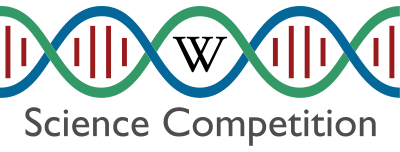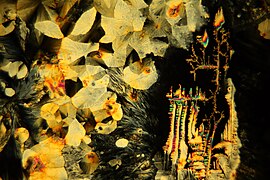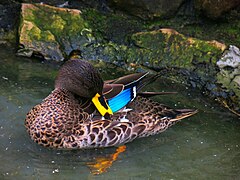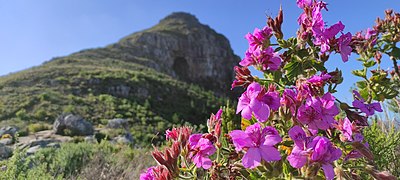Wikipedia:Wiki Science Competition 2023 in South Africa
Wiki Science South Africa 2023 is a scientific photo contest for research photographs organised by Wikimedia Community South Africa aiming to promote and engage people with science in South Africa and beyond. The competition runs from 1 December 2023 to 31 January 2024. Wikimedia South Africa is organising the South African arm of the competition. A very special category for Wiki Science in South Africa is the Fynbos category. Wiki Science South Africa 2023 is part of the international Wiki Loves Science photography competition.
To participate, you must:
- Be the author of pictures/submissions you upload.
- Must have the rights (copyright) to upload your submissions.
- The photographs should be of a high quality and large size, and need to have a good description including what the image depicts, how and where it was made, and what is important to notice about it (please including any links to peer-reviewed publications if appropriate, not required but a very nice thing to have).
- Use the Wikimedia Commons category: Images from Wiki Science Competition 2023 in South Africa to enter your pictures into the competition; alternatively you can press the blue button above on this page to submit your photographs. It is encouraged to add the images to other additional appropriate Commons categories. For more details, see the full international rules.
If you are new to Wikipedia then you can learn more about how to enter at the WikiScience Competition page here.
You can see all the photographs so far submitted to the competition on Wikimedia Commons here.
2023 Winners[edit]
The winners for the 2023 South African WikiScience competition are:
-
First prize: Spotted Eale Owl by JeremyChallis
-
Second prize: Testing for Xanthomonas campestris.jpg by Siduduziwe Nxumalo
2021 Winners[edit]
In South Africa[edit]
-
First prize: Crystal melt of sulphur and urea by Molekools
-
Second prize: True Colours (a yellow-billed Teal Anas undulata) by BeanieAll
-
Best fynbos photograph: Brown-tipped Strawflower by AJ Higgs
-
Second best fynbos photograph: Cape Mallow by AJ Higgs
Global[edit]
-
A larva of a non-biting midge under polarized light. Winner of the Microscopy images category 2021, Karl Gaff, Ireland
-
A California red-sided garter snake in its natural habitat. Winner of the Nature category 2021, Jaden Clark, USA
-
The supernova remnant Jellyfish Nebula (IC443) and its surroundings. Winner of the Astronomy category 2021, Ram Samudrala, USA
-
A Wilson's cloud chamber visualizing the passage of ionizing radiation. Winner of the Non-photographic media category 2021, Maxim Bilovitskiy, Estonia
-
Research activity of young scientists at the Kyiv and Kaniv reservoirs. Winner of the research in science category 2021, Bilous Olena, Ukraine
-
Complete and partial pseudomorphs of malachite over azurite spherical crystals. Winner of the General category 2021, Masha Milshina, Russia
Categories and prizes[edit]
The competition is divided into seven categories. The South African jury will select five finalists from each category to submit to the international competition. The categories are:
- Fynbos. Do you have any pictures of fynbos plant species? This is a very special category for us given the need for pictures of fynbos species on Wikipedia. Special prizes will be awarded for winning pictures of South African fynbos. Fynbos submissions will be submitted to the global competition under the 'Wildlife and Nature' category.
- People in science. Got a photograph of a notable scientist you've always wanted to share? Perhaps a photograph of your dissertation advisor or colleague? We want your photos of scientists!
- Microscopy. Photos of small things can be big contributions!
- Astronomy. Photos of big things can be big contributions too!
- Non-photographic media. For those really cool diagrams you have made; or a computer-generated image; or even audio or video of a research result, or a scientific method being performed.
- Image sets. This category is for sets of multiple thematically linked images.
- Wildlife and nature. A category for wild organisms you find growing or living in nature, including macro photography.
- General. Everything else. Examples include: archaeology, volcanology, X-ray images, ...
The judges will also select an overall first and second place winning photograph. There is a special prize for the first and second place winning photograph in the Fynbos category. For the international copetition the fynbos finalists will be submitted under the "wildlife and nature" category.
Prizes[edit]
All prizes will be given in the form of Amazon gift vouchers.
Prizes for all categories combined, except the fynbos category, are:
- First prize: R3000
- Second prize: R1500
Winning pictures in the fynbos category are:
- First prize: R3000
- Second prize: R1500
Can I submit that image?[edit]
Working out the copyright status of images you might want to submit can be tricky. The guidance here should tell you whether you can upload your photograph. If you have any questions, please contact us on the talk page. Note that these guidelines are South African-specific and may not apply to other countries.
- In general, publication status determines whether you can upload an image.
- If the image is unpublished, you generally have the rights to upload it. University and government intellectual property agreements usually do not cover copyright in text or images. If you work for a for-profit company, check with your employer.
- If the image is published in a journal, you need to check the journal's copyright agreement. When you publish in a journal, you usually transfer the copyright to them, and you no longer own the rights to the images. The exceptions are if the article is published under an acceptable Creative Commons or other free-content license (such as PLOS journals), or under an arrangement where you retain copyright (such as Nature journals). Additionally, authors usually retain the copyright to Supplementary Information documents, so you can upload those. SHERPA/RoMEO is a tool that can tell you the copyright status of articles submitted to any scientific journal.
- However, there are some types of images that can always be uploaded regardless of publication status.
- Was the photograph taken more than fifty years ago? The copyright of photographs taken in South Africa expire after 50 years so if the picture was taken before 1970 then the copyright is not longer applicable.
- Some types of images are never eligible for copyright, and can be uploaded. These are images that do not meet the threshold of human creativity required by U.S. copyright law (where the Wikimedia servers are located), usually because they are too simple, represent commonly known data, or are products of nature. Examples include chemical structural formulas, medical diagnostic images, diagrams of knots, and monkey selfies. Please use the appropriate copyright tag when uploading these images.
Jury[edit]
The jury for the South African competition is:












